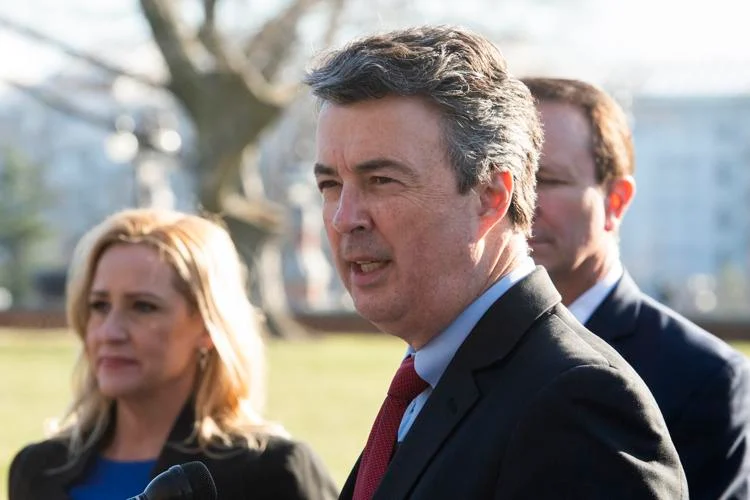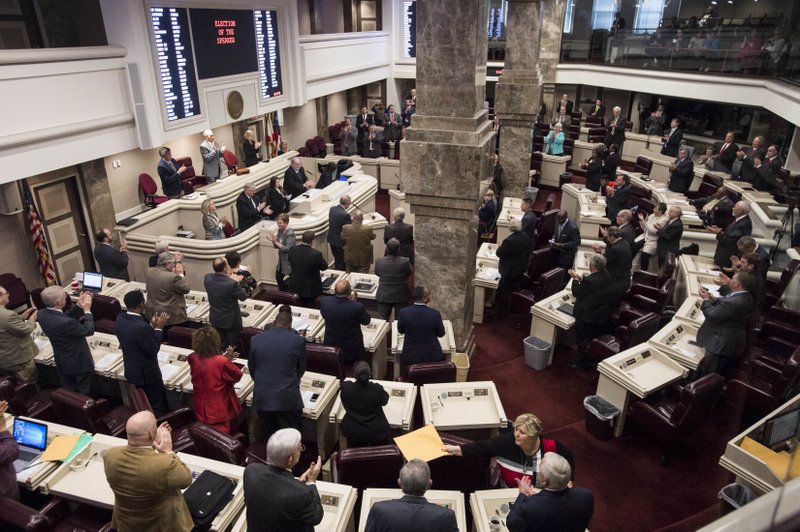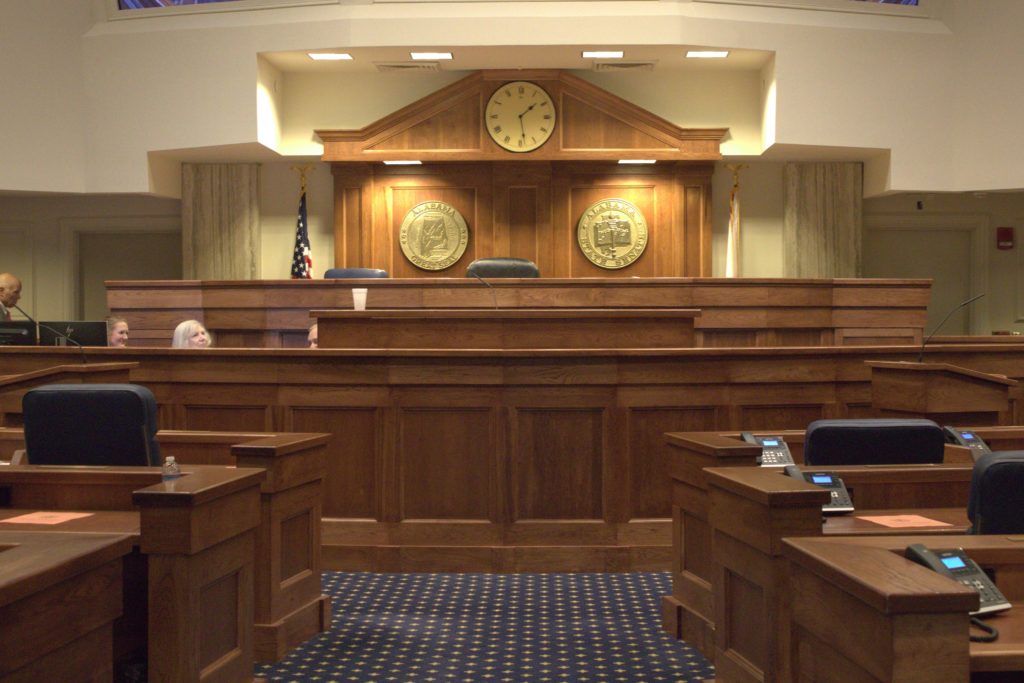Marshall applauds court victory in vulnerable child protection and compassion act

On Monday, Alabama Attorney General Steve Marshall issued a statement applauding a decision by the U.S. Court of Appeals for the Eleventh Circuit to vacate a preliminary injunction that had been entered by a district court last year in Eknes-Tucker v. Marshall. The federal appeals court decision will soon enable the state to enforce the Alabama Vulnerable Child Compassion and Protection Act, which prohibits administering sex-modification procedures to minors. “The Eleventh Circuit reinforced that the State has the authority to safeguard the physical and psychological wellbeing of minors, even if the United States Attorney General and radical interest groups disapprove,” said AG Marshall. “Alabama takes this responsibility seriously by forbidding doctors from prescribing minors sex-modification procedures that have permanent and often irreversible effects. This is a significant victory for our country, for children, and for common sense.” Alabama’s Vulnerable Child Protection and Compassion Act was sponsored by State Senator Shay Shelnutt (R-Trussville) and then State Representative Wes Allen (R-Troy) – Allen was elected Secretary of State last year. Marshall has defended this and similar laws to protect children from sterilizing medical interventions. Marshall says that these procedures are being pushed by medical interest groups that are driven by the pursuit of profit and radical ideology. In August, Marshall led a multistate brief in Missouri highlighting what he calls the dishonesty of advocacy groups like the World Professional Association for Transgender Health (WPATH). Similarly, in July, General Marshall filed a brief on behalf of 21 states in the Sixth Circuit Court of Appeals supporting Tennessee’s and Kentucky’s laws protecting minors from chemical and surgical sex-modification procedures for kids. The Alabama Vulnerable Child Compassion and Protection Act was signed into law in April 2022. On May 13, 2022, the federal district court issued a preliminary injunction enjoining the law from being enforced. Monday’s ruling lifts that preliminary injunction. The case will still proceed through the federal court system. Advocates for these controversial procedures vow to continue their court fight. In lifting the injunction, the judges wrote that states have “a compelling interest in protecting children from drugs, particularly those for which there is uncertainty regarding benefits, recent surges in use, and irreversible effects.” Steve Marshall was appointed Alabama Attorney General in 2017. He was elected in his own right in 2018 and then re-elected for his second full term in 2022. Before he served as AG, Marshall was the district attorney for Marshall County. To connect with the author of this story or to comment, email brandonmreporter@gmail.com.
Wes Allen addresses the Republican Women of Trussville

Alabama Secretary of State Wes Allen spoke on Thursday to the Republican Women of Trussville (RWOT) at the Trussville Civic Center. Allen said that he was sworn in as Alabama’s Secretary of State in January and that both of his two children are now in college. “It has been a big year,” Allen said. “We have got both kids out of the house. It is an adjustment when the kids move out.” “I was born and raised in Tuscaloosa County at the end of a dirt road,” Allen said. From 2018 to 2022, Allen represented Pike County in the Alabama House of Representatives. The group applauded him for sponsoring legislation forbidding doctors from performing gender-altering procedures and treatments on children. “I introduced the House legislation, but the man in the back of the room, (State Senator) Shay Shelnutt, was the man in the Senate,” Allen said. “It took us three years to get it passed.” Shelnutt said, “It should not have taken that long.” “Those procedures, no matter what they tell you, is not reversible,” Allen continued. “It is tied up in federal court,” Allen said. “We will see how that progresses.” RWOT President Terri LaPoint praised the group for their door-knocking to help elect Mike Bolin to the Jefferson County Commission in a recent special election, thus maintaining a 3 to 2 Republican control of the Commission. “Mile Bolin’s win – that was a huge race,” Allen said. “Door knocking makes a big difference. “The best thing we can do is elect conservative people at the local level,” Allen said. “Mike Bolin – it is important to elect conservatives at the county commission level, at the city council level, at the school board level. We have seen how important it is to have conservatives on the library board. Prior to his service in the legislature, Allen was the Probate Judge of Pike County. Allen said his experience as a probate judge helped prepare him to be Secretary of State. “They are our customers,” Allen said of persons coming to their office. “We may not have the government service they want, but they are looking for help. It is our duty as public officials to help them with their problem.” Sometimes the people who came to the Pike County Probate Judge’s office were not in the right office. “Whether or not we could help their problem, we wanted to get them to the right place,” Allen explained. “I take that philosophy with me to the Secretary of State’s office.” “The Secretary of State’s office has 40 employees,” Allen explained. “35 are merit-based. They are here from administration to administration. We have some that are political appointees – the executive staff: Chief of staff, legal counsel, deputy legal counsel, director of legislative affairs, that sort of things.” “We have had a lot of speaking requests,” Allen said. His focus has been on doing the job and “getting things done” in his first six months on the job. “We are now moving around a little more. It is a pleasure to be here.” Allen said that his office recently became aware of a scam using the name of the Alabama Secretary of State’s office. “We are working closely with the Securities Exchange Commission to make sure they don’t get any kind of money, no matter how small,” Allen said. Allen said that he does not court attention and just does his job. “I shouldn’t be running over people to get in front of a camera,” Allen said. Allen said it is important for him to get out into communities and explained that he schedules two or three meetings in towns that he visits to get the pulse of that community. “We want to make sure that we are not so connected in Montgomery that we forget what is happening in Trussville or what is happening in Moulton,” Allen said. “We are fighting fraud in the election side as well,” Allen said. “As a former probate judge, I know what it is like to be at the courthouse at 5:30 on election day, and I know what it is to be the last person to walk out of the courthouse and lock the doors.” “There will be a lot of eyeballs on these secretary of states offices next year,” Allen said. “We are already making preparation for 2024.” “We had illegal immigrants who were stealing IDs in North Alabama,” Allen said. “They were even voting in local elections.” “We removed a board of registrar for registering people who did not live at the location where she registered them,” Allen said. “We removed her. We are not a prosecuting agency, so we turned it over to the local DA in Houston County.” “It all starts in the Board of Registrars offices,” Allen said. “They do a wonderful job, but we had this one person we needed to remove.” “The more I learned about ERIC and studied it, it was really a data mining operation,” Allen said of his controversial decision to withdraw from the ERIC system for managing the voter rolls. “It has been like eight states that have followed our lead,” Allen said. “I cannot talk about the Alabama whole plan that we are putting out yet, but I think you will be proud of what we come up with.” Allen said that in his legislative agenda, “We wanted to solidify our election process.” “It doesn’t take Alabama weeks to count ballots like you have seen across the country,” Allen said. “With the help of Shay Shelnutt, we are always going to have a paper ballot to vote on even after I am gone. Matt Simpson carried it in the house.” “You will always vote on paper ballots in Alabama,” Allen said. “A great piece of legislation. It is common sense.” Allen said that Sen. Clyde Chamblis and Simpson carried his legislation “to make sure that our tabulators cannot be connected to the internet.” The legislature also passed his legislation for a poll worker pay increase. That bill was carried by Rep. James Lomax and Sen. Sam Givhan. “We have partnered with the Alabama State Bar so that
Controversial anti-vaping legislation carried over in the Alabama Senate

The Alabama Legislature passed dozens of bills on Thursday, with time running out on the 2023 Alabama Regular Legislative Session. Controversial anti-vaping legislation was not one of them. That bill was carried over in the Senate after widespread opposition lobbied Senators not to pass the bill. House Bill 319 (HB319) is sponsored by State Representative Barbara Drummond (D-Mobile). It is being carried in the Alabama Senate by State Senator Garlan Gudger (R-Cullman). Sen. Gudger said, “We do have a few amendments.” State Senator Tim Melson (R-Florence) said the Alabama Cancer Action Network opposed the bill. “This isn’t a quack organization,” Melson said. “They and the Heart Association and the lung people are against this bill.” Gudger said, “They want all tobacco and nicotine in existence eliminated.” “I don’t know how you are going to move it,” Melson said. “I can’t support this if they are against it.” Sen. Rodger Smitherman (D-Birmingham) said, “I think it is a crying shame that instead of doing something, they would rather do nothing. Doing nothing here is going to continue to allow these kids to continue vaping.” “They are going to continue vaping like I don’t know what,” Smitherman said. “They want to yank us around like a yoyo. Look at the impact if you don’t do anything.” Smitherman compared the Senator’s unwillingness to pass health legislation not supported by health associations to the failure of his plan to require a formal due process for school discipline decisions because it was universally opposed by the Alabama state school superintendents. “You care more about these little folks that call you, like the superintendents, than you do the little children,” Smitherman said. Smitherman said that Drummond had a negotiated bill. “She negotiated with them, and they agreed with what that bill was,” Smitherman said. “That’s not right.” “I am not going to stop fighting for the kids,” Smitherman said. “If you don’t pass this bill, they are going to vape for a whole year.” HB319 creates a registry of vape sellers. The Alcohol and Beverage Control Board would run the registry and enforce the bill. It also limits vaping to people 21 and above and fines underage people who vape. “For the sake of the children, take out the due process,” Smitherman told Gudger. Sen. Shay Shelnut (R-Trussville) told Gudger to “carry this over at the call of the chair.” Gudger finally asked that the bill be carried over at the call of the chair. It never came back that day. Gudger later told reporters, “(Health groups) want all tobacco eliminated, and we can’t do that. They want their way or nothing.” Groups like the Alabama Heart Association have opposed this legislation because they object to people who vape being fined by the state and claim that it does not go far enough in regulating tobacco companies. Jada Shaffer is the senior regional lead of governmental affairs for the American Heart Association. “As the mother of a son who started using chewing tobacco at 14 and purchased it at our local gas station, I know this is a problem all too well,” said Shaffer. “I am pleading with lawmakers to take bold steps in ensuring that no child is exposed again to these deadly products and that the retailers in Alabama are held accountable if they sell to minors. Big tobacco targeted kids with fruity flavors and successfully addicted a whole new generation of kids to nicotine. And now they are shifting the blame to kids and penalizing them. HB319/SB271 further victimizes Alabama’s children all over again.” House Bill 319 could be brought back when the Legislature meets for its last day of the session on Tuesday. The legislation would have to be approved by the Senate – and then the House of Representatives would have to vote to accept any changes made by the Senate for it to reach the Governor’s desk. Any legislation not on the Governor’s desk by the close of the legislative day on Tuesday will have to be brought back next year as the regular session will end. The legislature is limited to a maximum of thirty days by the Alabama Constitution. To connect with the author of this story or to comment, email brandonmreporter@gmail.com.
Controversial anti-vaping legislation carried over in the Alabama Senate

The Alabama Legislature passed dozens of bills on Thursday, with time running out on the 2023 Alabama Regular Legislative Session. Controversial anti-vaping legislation was not one of them. That bill was carried over in the Senate after widespread opposition lobbied Senators not to pass the bill. House Bill 319 (HB319) is sponsored by State Representative Barbara Drummond (D-Mobile). It is being carried in the Alabama Senate by State Senator Garlan Gudger (R-Cullman). Sen. Gudger said, “We do have a few amendments.” State Senator Tim Melson (R-Florence) said that the Alabama Cancer Action Network is opposing this bill. “This isn’t a quack organization,” Melson said. “They and the heart association and the lung people are against this bill.” Gudger said, “They want all tobacco and nicotine in existence eliminated.” “I don’t know how you are going to move it,” Melson said. “I can’t support this if they are against it.” Sen. Rodger Smitherman (D-Birmingham) said, “I think it is a crying shame that instead of doing something, they would rather do nothing. Doing nothing here is going to continue to allow these kids to continue vaping.” “They are going to continue vaping like I don’t know what,” Smitherman said. “They want to yank us around like a yoyo. Look at the impact if you don’t do anything.” Smitherman compared the Senator’s unwillingness to pass health legislation not supported by health associations to the failure of his plan to require a formal due process for school discipline decisions because it was universally opposed by the Alabama state school superintendents. “You care more about these little folks that call you, like the superintendents, than you do the little children,” Smitherman said. Smitherman said that Drummond had a negotiated bill. “She negotiated with them, and they agreed with what that bill was,” Smitherman said. “That’s not right.” “I am not going to stop fighting for the kids,” Smitherman said. “If you don’t pass this bill, they are going to vape for a whole year.” HB319 creates a registry of vape sellers and assigns that and enforcement of the bill to the Alcohol and Beverage Control Board. It also limits vaping to people 21 and above and fines underage persons who vape. “For the sake of the children, take out the due process,” Smitherman told Gudger. Sen. Shay Shelnutt (R-Trussville) told Gudger to “carry this over at the call of the chair.” Gudger finally asked that the bill be carried over at the call of the chair. It never came back that day. Gudger later told reporters, “(Health groups) want all tobacco eliminated, and we can’t do that. They want their way or nothing.” Groups like the Alabama Heart Association have opposed this legislation because they object to young people who vape being fined by the state and claim that it does not go far enough in regulating tobacco companies. Jada Shaffer is the senior regional lead of governmental affairs for the American Heart Association. “As the mother of a son who started using chewing tobacco at 14 and purchased it at our local gas station, I know this is a problem all too well,” said Shaffer. “I am pleading with lawmakers to take bold steps in ensuring that no child is exposed again to these deadly products and that the retailers in Alabama are held accountable if they sell to minors. Big tobacco targeted kids with fruity flavors and successfully addicted a whole new generation of kids to nicotine. And now they are shifting the blame to kids and penalizing them. HB319/SB271 further victimizes Alabama’s children all over again.” House Bill 319 could be brought back on Tuesday. If it does not pass the Senate – and then the House of Representatives approves any changes made by the Senate by the end of the legislative day on Tuesday, the legislation will die as Tuesday is Day 30 of the legislative session – the legislature is limited to a maximum of thirty days by the Alabama Constitution. To connect with the author of this story or to comment, email brandonmreporter@gmail.com.
Legislature votes to ban exhibition driving

On Tuesday, the Alabama State Senate voted in favor of legislation outlawing street racing and other forms of exhibition driving, such as tire burnouts and doing donuts with a motor vehicle. State Representative Allen Treadaway sponsored House Bill 29 (HB29). HB29 was carried in the Senate by Sen. Rodger Smitherman, who sponsored the Senate version of the bill. Smitherman explained to the Senate that Rep. Treadaway is a former City of Birmingham Deputy Police Chief and is sponsoring the same legislation in the Alabama House of Representatives. “I don’t have a problem with the House bill,” Smitherman said. “It is the same bill.” “There have been several instances of people getting hurt through this dangerous driving,” Barfoot said. “I have been almost run over,” said Sen. Shay Shelnutt. “I have seen this problem personally in our county.” The Alabama Big 10 Mayors have endorsed legislation to impose criminal penalties on exhibition driving. “This is something that the Mayor of Birmingham and the Mayor of Hoover asked us to support,” Rep. Susan Dubose said. “We have had 16 persons and a baby killed by a Dodge Charger that was doing donuts with a crowd watching.” “In our area, we have had four people killed,” Smitherman said. “Currently, all you can do is misdemeanors.” “Exhibition driving” is when a driver purposefully drives intentionally to create unnecessary engine noise, tire skids, burnouts, and other dangerous and dangerous and damaging driving techniques. This growing problem across Alabama cities creates a public safety hazard for pedestrians and other drivers while draining limited law enforcement resources. A first violation shall be guilty of a Class C misdemeanor. A second or subsequent violation shall be guilty of a Class B misdemeanor. In addition, the court may prohibit the person from driving a motor vehicle on the public highways of this state for a period not exceeding six months. If a person operating a motor vehicle violating this ban causes bodily injury to another individual, or the offense proximately causes damage to any property, the person shall be guilty of a Class A misdemeanor. In addition, the court shall prohibit the person from operating a motor vehicle on the public highways of this state for six months. If a person violates this ban and, in the commission of this act, causes serious physical injury to a person other than the driver, the person shall be guilty of a Class C felony. In addition, the court shall prohibit the person from operating a motor vehicle on the public highways of this state for two years. If a person commits a violation of this law and the commission of the offense proximately causes death to any person, the person shall be guilty of a Class B felony. In addition, the court shall prohibit the person from operating a motor vehicle on the public highways of this state for not less than two years. HB29 passed the Senate 33 to 0. The legislation now goes to Gov. Kay Ivey’s desk for her consideration. Wednesday will be day 17 of the 2023 Alabama Regular Legislative Session. To connect with the author of this story or to comment, email brandonmreporter@gmail.com.
Donnie Chesteen uses stalling tactics to effectively kill education choice bill

On Wednesday, the Alabama Senate Education Policy Committee failed to vote on a school choice bill that was debated before the Committee. Instead, the bill has been referred to another committee for their consideration. Senate Bill 202 (SB202) is sponsored by Sen. Larry Stutts. Over 200 people crowded into an overflowing public hearing in the Alabama Senate Education Policy Committee. Opponents and proponents of school choice both presented their arguments for and against in a time restricted format. Based on the applause and cheers it appeared that proponents far outnumbered the people there in opposition to the bill. Following the debate, the Republican Chairman of the Committee, Donnie Chesteen, said that his committee would not vote today on the bill. “We will not take a vote today,” Chesteen said. “My recommendation is that we refer this to the education budget committee.” “We are talking about hundreds of millions of dollars out of the education budget,” Chesteen said. “We need to know what we are cutting.” “I asked that it be referred to the budget committee when I introduced it,” Stutts said. “I understand the stalling tactics that are playing out,” Stutts said. Thursday will be the 15th legislative day. The Alabama Constitution limits the regular session to a maximum of thirty legislative days. Under the rules of the Alabama legislature, it takes a minimum of five legislative days for a bill to pass. If the bill bounces from committee to committee for the next three or four weeks, there won’t be time for the bill to get to the floor of the second house for an up or down vote before the session ends. “I have never seen that,” Sen. Stutts told Alabama Today referring to the Chairman re-referring the bill to a second committee and expecting it to come back to the first committee for consideration. The House of Representatives has passed rules abolishing the practice of re-referring a bill from one committee to another before it can be considered by the full body. The Senate has not adopted that rule. “I am going to have a talk with the Chairman,” Stutts told Alabama Today. Dr. Arthur Watts is the Finance Director of the Montgomery City School System. “This bill could cost $600 million,” Watts told the Committee. The typical teacher costs about $70,000. That includes $10,000 in benefits. Just one fourth of that, $150 million divided by $70,000 would be a loss of over 2080 teachers. Half that would be $300 million. That would be a loss of 4160 teachers. If it cost all of that, $600 million, that would be a loss of 8320 teachers. Eagle Forum Director Becky Gerritson said, “Education dollars should go to educate the children.” “We already do this in higher education,” Gerritson said. “We take money in the form of Pell Grants and allow them to use the money the way they want. They can go to state schools, private schools, or technical schools. We do this all the time with higher ed.” Gerritson said there would not be a mass exodus from public to private schools if SB202 passed. “They will still get 98% of the students, but that little bit of competition makes the difference,” Gerritson said. “When private schools fail they close, when public schools fail we give them more money.” Gerritson explained that the bill sets up an educational savings account for every child that elects to opt out of the existing public school system. “The money goes directly from the account to a vender,” Gerritson said. “We can track every dollar.” Gerritson said that Eagle Forum backs this approach to school choice rather than existing programs like the Accountability Act and charter schools, because, “This one provides the biggest impact and the fastest.” Allison King with the Alabama Education Association (AEA) spoke against the bill. “Before I came to work for AEA, I worked ten years as a classroom teacher and an administrator,” King said. “We do currently have school choice in our state, and it is not being fully utilized.” King said that this bill has a “lack of accountability and oversight.” King said that the bill creates the opportunity for fraud by both the parents and the education vender the parents select. “The fraud would have to be substantial for it be actionable,” King said. King said that the legislation would allow parents to use the money on purchasing an ipad, sending their kid to Space Camp, or to play travel ball. “All of these things are allowable,” King said. “They can even get accountability act funding and still receive funding through the PRICE Act” The program would be phased in over three years with kindergartern through third grade in phase one. Proponents estimate that most of the children who would get the education savings accounts are already in private schools and of the 80,000 Alabama children who go to private school now about 75% would opt in to the program. “The saddest thing I have had to deal with as a realtor is families having to move because they are chasing schools,” said Sen. Shay Shelnutt. “Thank you Dr. Stutts for bringing this bill forward and I full support this bill.” “I appreciate all that accountability bills we have passed, but by all those measures we are still in last place or very near last place in education,” Stutts said. “That hurts our state on a whole lot of levels and not just on the real estate movement.” Stutts listed the Literacy Act, the Numeracy Act, the Accountability Act, and other efforts by legislators to improve education in the state. “This has the opportunity to change education faster than all of those other things combined,” Stutts said. “Where we rank in education is important.” Stutts explained that the money left over in the education savings account is available for the students. “You are able to use that money until you are 21,” Stutts said. The money left over from K-12 in a child’s account could be used for college or
Senate passes legislation to ban exhibition driving

On Thursday, the Alabama State Senate voted in favor of legislation outlawing street racing and other forms of exhibition driving, such as tire burnouts and doing donuts with a motor vehicle. Senate Bill 58 (SB58) is sponsored by State Sen. Rodger Smitherman. Smitherman is a Democrat from Birmingham. “In our area, we have had four people killed,” from racing Smitherman said. “Currently, all you can do is misdemeanors. Sen. Will Barfoot spoke in support of the legislation. “This really does give law enforcement the option to really clamp down on this,” Sen. Barfoot said. Smitherman said, “My house sponsor is Rep. Treadaway.” Smitherman explained that Rep. Allen Treadaway, the former City of Birmingham Deputy Police Chief, is sponsoring the same legislation in the Alabama House of Representatives. “I don’t have a problem with the House bill,” Smitherman said. “It is the same bill.” “There have been several instances of people getting hurt through this dangerous driving,” Barfoot said. “I have been almost run over,” said Sen. Shay Shelnutt. “I have seen this problem personally in our county.” The Alabama Big 10 Mayors have endorsed legislation to impose criminal penalties on exhibition driving. “Exhibition driving” is when a driver purposefully drives intentionally to create unnecessary engine noise, tire skids, burnouts, and other dangerous and dangerous and damaging driving techniques. This growing problem across Alabama cities creates a public safety hazard for pedestrians and other drivers while draining limited law enforcement resources. A first violation shall be guilty of a Class C misdemeanor. A second or subsequent violation shall be guilty of a Class B misdemeanor. In addition, the court may prohibit the person from driving a motor vehicle on the public highways of this state for a period not exceeding six months. If a person operating a motor vehicle violating this ban causes bodily injury to another individual, or the offense proximately causes damage to any property, the person shall be guilty of a Class A misdemeanor. In addition, the court shall prohibit the person from operating a motor vehicle on the public highways of this state for a period of six months. If a person commits a violation of this ban and, in the commission of this act, causes serious physical injury to a person other than the driver, the person shall be guilty of a Class C felony. In addition, the court shall prohibit the person from operating a motor vehicle on the public highways of this state for a period of two years. If a person commits a violation of this law and the commission of the offense proximately causes death to any person, the person shall be guilty of a Class B felony. In addition, the court shall prohibit the person from operating a motor vehicle on the public highways of this state for not less than two years. SB58 passed the Senate 33 to 0. The legislation now moves to the Alabama House of Representatives, where it has been referred to the House Homeland Security and Public Safety Committee. Rep. Treadaway’s companion legislation, House Bill 29 (HB29), has already received a favorable report from the committee. HB29 could be considered by the full House of Representatives as early as Tuesday. Tuesday will be day 8 of the 2023 Alabama Regular Legislative Session. To connect with the author of this story or to comment, email brandonmreporter@gmail.com.
72 bills have been prefiled ahead of 2023 regular session

The 2023 Alabama Regular Legislative Session begins on Tuesday. State Legislators are busy preparing for the legislative session by making the last touches on the bills they plan to sponsor in the upcoming weeks. Already 72 bills have been pre-filed ahead of the session. Alabama Today has begun examining these pieces of legislation. Twice we have reviewed ten of the most interesting of these pieces of legislation. This article looks at another ten. Senate Bill 26 is sponsored by State Sen. Merika Coleman. Under existing law, a private person may conduct a citizen’s arrest for certain public offenses. This bill would repeal an existing law authorizing a citizen’s arrest. This bill relating to the criminal procedure would repeal Section 15-10-7, Code of Alabama 1975, relating to arrests by private persons. SB26 would strike this section from current law: “(a) A private person may arrest another for any public offense: (1) Committed in his presence; (2) Where a felony has been committed, though not in his presence, by the person arrested; or (3) Where a felony has been committed and he has reasonable cause to believe that the person arrested committed it….” Senate Bill 22 was introduced by State Sen. Andrew Jones. Under existing law, each county and municipality must establish a local emergency management organization to maintain public safety within its territorial limits in the event of a natural or manmade disaster or public health emergency pursuant to the state emergency management plan. The local emergency management organization is administered by a director who operates under the control of the governing body of the county or municipality. The director receives an annual salary supplement from the Alabama Emergency Management Agency in an amount necessary to provide the director an annual salary of $40,000, provided the supplement is capped at $12,000. SB22 would revise the authority of local emergency management organizations relating to entering into contracts for supplies and services for disaster relief to authorize the letting of contracts outside of the parameters of the competitive bid law if certain conditions are met. This bill would increase the annual supplemental allocation to local organizations from the state Local Emergency Management Assistance Fund from $12,000 to $17,000, to be subsequently adjusted every five years by the Consumer Price Index. This bill would provide that coursework required for certification as a local emergency management director must be recommended by the Alabama Association of Emergency Managers and approved by the Director of the Alabama Emergency Management Agency. Senate Bill 24 is sponsored by State Sen. Greg Albritton. Under existing law, indemnification agreements in contracts for the professional services of a design professional or for the construction of a road or bridge are prohibited from requiring a party to the contract to indemnify, hold harmless, or defend another party to the contract for any damages arising from the negligent conduct of the party to be indemnified. SB24 would regulate indemnification agreements between parties to a construction contract to prohibit a party to a construction contract from being required to indemnify, hold harmless, or defend another party to the construction contract for liability caused by the sole negligence, or by the wantonness, recklessness, or intentional misconduct, of the party to be indemnified. This bill would also prohibit indemnification agreements in a construction contract from requiring a party to the contract to indemnify, hold harmless, or defend another party to the contract for that party’s own negligence unless certain requirements are met, including an agreement on the extent of the monetary limit of the indemnification. The bill would limit the indemnitor’s indemnification obligation to the agreed-upon monetary limitation and would require the indemnitor to obtain insurance for that amount. Senate Bill 17 is sponsored by State Sen. Tom Butler. Under existing law, the United States Army, United States Navy, United States Marine Corps, United States Air Force, and United States Coast Guard are collectively called the United States Armed Forces. This bill would provide that all references to the United States Armed Forces shall include the United States Space Force. Senate Bill 19 is sponsored by State Sen. William “Billy” Beasley. Under existing law, the Alabama Job Creation and Military Stability Commission is comprised of one retired senior member of the United States Armed Forces for each of the four major military facilities in Alabama: Redstone Arsenal, Anniston Army Depot, Maxwell Air Force Base including the Gunter Annex, and Fort Rucker. This bill would expand the membership of the commission to include a retired senior member of the Armed Forces for Fort Benning – which is actually in Georgia but is so close to the state line that military personnel at Fort Benning routinely live in Greater Phenix City, Alabama and beyond. Senate Bill 21 is sponsored by Sen. Linda Coleman-Madison. Under existing law, an individual who has lost their right to vote based upon a past criminal conviction may apply to the Board of Pardons and Paroles for a Certificate of Eligibility to Register to Vote under certain circumstances, including payment of all fines, court costs, fees, and victim restitution as ordered by the sentencing court and completion of probation or parole and release from compliance by the court or Board of Pardons and Paroles. This bill would eliminate the application requirement and the Certificate of Eligibility to Register to Vote and require the Board of Pardons and Paroles to determine whether an individual may have their right to vote restored if the individual has lost their right to vote because of conviction in a state or federal court and has been pardoned or released from incarceration or period of probation or parole. This bill would allow an indigent individual to have their right to vote restored if they have paid all fines and restitution and is in compliance with an approved payment plan for the payment of court costs and fees or an approved community service plan to offset the payment of court costs and fees. Senate Bill 13 is sponsored by Sen. Tim Melson. Under existing law, physical therapy may only be performed based on a referral from a licensed physician, dentist, chiropractor, physician assistant,
Seven State Senate seat races to watch

All 35 State Senate seats are up for grabs in the November 8 general election. Republicans hold a 27 to 8 margin over Democrats in the current makeup of the Alabama Senate. The Alabama Republican Party is running candidates in 29 seats. The GOP is defending all of the 27 seats they currently hold and are running candidates in two districts currently held by Democrats. Alabama Democrats are defending the eight seats they currently hold and are challenging the GOP in six districts currently held by Republicans. Libertarians currently hold no seats in the Alabama Senate but are running twelve candidates in State Senate races. There are a number of contested State Senate races on the November ballot. These are the seven races with the most chance of becoming interesting. Democrat Lisa Ward is challenging Republican incumbent State Sen. Gerald Allen in Senate District 21. Both of these candidates are well known in the Tuscaloosa area. Allen has represented the district for three terms and served in the Alabama House of Representatives before that. Ward is a former city councilwoman who is very active in the community. According to filings with the Alabama Secretary of State’s office, Allen has a $204,872.68 campaign account balance entering September, which includes August contributions of $8,250. Ward, the challenger, meanwhile raised $23,149.76 in August and has a cash balance of $31,968.94 entering September. Neither faced a primary opponent. Democrat Kim Lewis versus Republican incumbent State Sen. Tom Butler in Senate District 2. Butler has represented Madison County in the legislature for parts of five decades, but this is one of the fastest growing areas in the state, and there are thousands of new people that bring different politics with them to the area. Lewis is hoping that an increasingly purple Madison County will result in a win. Butler was pushed hard in the Republican primary by former State Sen. Bill Holtzclaw. Butler raised $44,500 in the month of August and enters September with $38,166.63. Lewis raised $7,830 in August and comes into September with $27,859.70. In Senate District 33, incumbent Democratic Sen. Vivian Figures faces Republican challenger Pete Riehm. This has been a very safe Democratic district consisting of the poorest parts of Mobile as well as Mobile County suburbs like Prichard, but redistricting meant that the new district now goes deep into Baldwin County and picked up the very prosperous and heavily Republican community of Spanish Fort. This district went from very blue to purple thanks to the legislature’s redistricting and efforts to “unpack” Black voters from majority-minority districts. Is it purple enough for a Republican to take it away from the Democrats? That is for the voters to decide on November 8. Sen. Figures raised $31,500 in the month of August to enter September with $110,497.02. Riehm had contributions of $19,577.54 in August and enters September with $60,911.31. Democrat Sherri Lewis versus Republican Jay Hovey in Senate District 27. Hovey, an Auburn City Councilman, just narrowly defeated incumbent Tom Whatley (R-Auburn) in a heavily contested GOP primary. Hovey, who has the challenge of unifying Republicans, raised $85,500 in contributions in August to enter September with a cash balance of $70,074.17. Reese meanwhile raised $1,806.20 in August to bring a total of $2,703.33 into the month of September. Senate District 23 – here, there are three candidates vying for the open seat formerly held by State Sen. Malika Sanders-Fortier, who vacated the seat in an unsuccessful bid for governor. Democrat Robert Lee Stewart narrowly defeated former State Sen. Hank Sanders in a hard-fought Democratic primary runoff in June. Stewart faces both a Republican in Michael Nimmer and a Libertarian in Portia Stephens. Stewart raised $16,987 in August to bring $17,872.84 into September. The Libertarian, Stephens, reported raising $2,060 in August to finish the month with $6,285 in cash on hand. The Republican, Nimmer, has not filed a campaign finance report. Alabama does not have general election runoffs, so when there are multiple candidates, the candidate with the most votes wins even if they got less than half of the votes. There is another three-way contest in Senate District 29. There, incumbent Republican Sen. Donnie Chesteen (R-Dothan) faces both Democrat Nathan “Nate” Mathis and Libertarian Floyd “Pete” McBroom. Matthis reported raising no money in August, but he has $5,719.36 in cash on hand. McBroom has not filed a campaign finance report with the Secretary of State’s office yet. The incumbent, Chesteen, raised $25,500 in August to enter September with $327,660.86. In Senate District 12, Republican Keith Kelley is battling Democrat David McCullars for the open seat currently held by Sen. Del Marsh. Kelley raised $29,658.24 in August and has $65,102.13 in cash on hand. McCullars only raised $265 in the month of August and entered the month of September with $4,377.15 in cash on hand. Kelley had a hard-fought Republican primary. This is a district that has given Marsh a close call in the 2014 general election. In other contested Alabama Senate races · SD3 incumbent Arthur Orr (R-Decatur) faces Libertarian Rick Chandler · SD4 incumbent Garlan Gudger (R-Cullman) faces Libertarian Jacob Marlow · SD6 incumbent Larry Stutts (R-Sheffield) faces Libertarian Kyle Richard-Garrison · SD7 incumbent Sam Givhan (R-Huntsville) faces Democrat Korey Wilson · SD15 incumbent Dan Roberts (R-Mountain Brook) faces Libertarian Michael Crump · SD17 incumbent Shay Shelnutt (R-Trussville) faces Libertarian John Fortenberry · SD24 incumbent Bobby Singleton (D-Greensboro) faces Libertarian Richard Benderson · SD25 incumbent Will Barfoot (R-Montgomery) versus Libertarian Louie Woolbright · SD28 incumbent Billy Beasley (D-Clayton) faces Libertarian David Boatwright · SD35 incumbent David Sessions (R-Grand Bay) faces Libertarian Clifton Hudson Republican incumbents Tim Melson, Greg Reed, Steve Livingston, Clay Scofield, Andrew Jones, Randy Price, April Weaver, Jabo Waggoner, Greg Albritton, Clyde Chambliss, Chris Elliott, and Jack Williams are all running unopposed. Republican newcomers Lance Bell in SD11 and Josh Carnley in SD31 are also unopposed in the general election. Democratic incumbents Rodger Smitherman, Linda Coleman-Madison, and Kirk Hatcher are all also unopposed in the general election. State Rep. Merika Coleman is unopposed in SD19, which is being vacated by the retirement of Priscilla Dunn (D-Bessemer). In 2022 Republican candidates in Alabama have received $44,321,108.97 in contributions. Political Action Committees have received $17,846,761.05. Democratic candidates have received $6,629,199.43, and all other candidates have received just $111,950.87. The general
The NRA Political Victory Fund announces primary endorsements

The NRA Political Victory Fund (NRA-PVF) has announced its endorsements for the May 24 primary in Alabama. The NRA-PVF is NRA’s political action committee. The NRA-PVF ranks political candidates – irrespective of party affiliation – based on voting records, public statements, and their responses to an NRA-PVF questionnaire. Mo Brooks received the endorsement and A rating for the U.S. Senate seat and incumbent Rep. Mike Rogers got an A rating and was endorsed for the U.S. House of Representatives. For the governor’s race, the group gave an A rating and endorsement to incumbent Kay Ivey. Incumbents continued to take the top spots in the Attorney General, State Senate, and House of Representatives elections. AG Steve Marshall received an A rating along with incumbent State Senators Tim Melson (Dist. 1), Tom Butler (Dist. 2), Steve Livingston (Dist. 8), Randy Price (Dist. 13), Dan Roberts (Dist. 15), Shay Shelnutt (Dist.17), Tom Whatley (Dist. 27), and Mike Jones (Dist.31). For the State House of Reps., the following incumbents received an A rating and endorsement: Phillip Pettus (Dist. 1), Parker Moore (Dist. 4), Proncey Robertson (Dist. 7), Tim Wadsworth (Dist. 14), Tommy Hanes (Dist. 23), Nathaniel Ledbetter (Dist. 24), Gil Isbell (Dist. 28), Debbie Wood (Dist. 38), Ginny Shaver (Dist. 39), Dickie Drake (Dist. 45), Jim Carnes (Dist. 48), Brent Easterbrook (Dist. 65), Jeff Sorrells (Dist. 87), Will Dismukes (Dist. 88), Rhett Marques (Dist. 91), and Matt Simpson (Dist. 96). State House of Rep. candidates that are not incumbents that received an A rating and an endorsement include Michael Hart (Dist. 49) and Troy Stubbs (Dist. 31). For the Sheriff’s elections, the following candidates received an A rating and endorsement: Max Sanders (Lawrence County), Joshua McLaughlin (Limestone County), Eric Balentine (Colbert County), and Matt Gentry (Cullman County).
Major issues to be decided in session’s final days
Alabama lawmakers return to Montgomery on Tuesday with a number of large issues to be decided in the closing days of the legislative session. Legislators expect to conclude the session next week. Here’s a look at some of the proposals that could be decided in the session’s final days. TEACHER PAY RAISES Lawmakers are expected to give final approval to the largest pay raise in a generation for teachers with nine or more years experience. The Senate approved the raises as part of next year’s education trust fund budget. The House of Representatives must decide whether to accept Senate changes, but House leaders have expressed support for the raises. The raise would be based on the teacher’s experience. A teacher with a bachelor’s degree and 20 years of experience would see their minimum salary rise from $51,810 to $57,214. School systems in Alabama and across the country have reported concerns about teacher shortages, particularly as the coronavirus pandemic accelerated a wave of retirements. That has led states to look at pay increases and other measures to try to recruit and retain educators. READING PROMOTION REQUIREMENT The House of Representatives on Tuesday will debate a proposal to postpone a high-stakes requirement to hold back third-graders who don’t read on grade level. The requirement of the 2019 Alabama Literacy Act is now scheduled to start this spring but would be pushed back until the 2023-2024 school year under the proposal. Many lawmakers expressed concern after the pandemic interrupted classrooms for two years. There is broad support for a delay, although lawmakers have disagreed on how long that delay should be. To move on to fourth grade, students would have to make above a “cut score” on standardized testing or demonstrate mastery of reading standards through a reading portfolio. State officials earlier this year said 23% of students scored below the set cutoff score on the latest assessment. DIVISIVE CONCEPTS The bill by Republican Rep. Ed Oliver of Dadeville would prohibit a list of “divisive concepts” from being taught in schools and in diversity training for state entities. The banned concepts would include that the United States is “inherently racist or sexist” and that anyone should be asked to accept “a sense of guilt” or a need to work harder because of their race or gender. The Alabama House of Representatives approved the bill after an emotional night of debate. The House-passed bill is awaiting committee action in the Alabama Senate. The list in the bill is similar to a now-repealed executive order that former President Donald Trump issued regarding training for federal employees. Similar language has since popped up in bills in more than a dozen states. TRANS TREATMENT BAN The Alabama Senate has approved a measure by Republican Sen. Shay Shelnutt of Trussville to make it a felony, punishable by up to 10 years in prison, for doctors to give transgender minors puberty-blockers, hormones, or surgeries to help affirm their gender identity. Proponents of the bill said the decisions on the medications should wait until a person is an adult. Opponents say lawmakers are inserting themselves into decisions that belong with families and their doctors. The Senate-passed bill, along with similar legislation by Republican Rep. Wes Allen of Troy, is pending in the Alabama House of Representatives. The U.S. Department of Justice last week sent a letter to state attorneys general warning that laws and policies that prevent individuals from receiving gender-affirming medical care might be an infringement on a person’s constitutional rights. REDEFINING RIOT The Alabama House of Representatives approved a bill that would create a new crime of assault of a first-responder and change the definition of a riot in state law. The bill defines a riot as “the assemblage of five or more persons engaging in conduct which creates an immediate danger of and/or results in damage to property or injury to persons.” The legislation is pending in the Senate committee. Rep. Allen Treadaway, a retired Birmingham assistant police chief, proposed the bill after a protest turned violent in Birmingham in the wake of George Floyd’s killing by police in Minneapolis. Opposed lawmakers say the definition of a riot is subjective, and an officer could make arrests based on his or her presumptions about the people involved. Republished with the permission of the Associated Press.
Kay Ivey signs six bills, ensuring Alabama as pro-military state

Today, Gov. Kay Ivey signed six bills aimed at making Alabama even more military-friendly. Those bills include Senate Bills 28, 99, 116, 119, 141, and 167. These bills were recommended by the Alabama Military Stability Commission, which is chaired by Lieutenant Governor Will Ainsworth. “Alabama is the most pro-military state in the nation, and I am proud to put my signature on a series of legislation aimed at ensuring that we are even more military-friendly,” stated Ivey. “I commend the work by the Military Stability Commission, chaired by Lieutenant Governor Ainsworth, as well as the members of the Alabama Legislature for passing these important bills.” SB116, sponsored by Sen. Tom Whatley and Rep. Debbie Wood, will help ease the burden of military families moving to Alabama. It allows children of active military members moving to Alabama to enroll in local public schools remotely without being physically present in the state. Three bills, SB99 by Sen. Andrew Jones and Rep. Kenneth Paschal, SB167 by Sen. Shay Shelnutt and Rep. Dickie Drake, and SB141 by Sen. Tom Butler and Rep. Parker Moore, are all aimed at making it easier for military families to find work when relocating to Alabama. Each of the bills allows for greater flexibility in occupational licensing for military spouses. SB28, sponsored by Sen. Tom Butler and Rep. Andy Whitt, would create the Space National Guard within the Alabama National Guard if the federal government creates the Space National Guard. Finally, SB119, sponsored by Sen. Will Barfoot and Rep. Dickie Drake, will expand scholarships provided under the Alabama G.I. and Dependents’ Educational Benefit Act to include in-state and private two-and four-year colleges. “The men and women from across Alabama who serve on the Military Stability Commission understand the important role that our bases and other infrastructure play in keeping the state’s economy strong and jobs growing,” commented Ainsworth. “The bills that the Legislature passed and Governor Ivey signed into law will assist our mission of making Alabama the nation’s friendliest and most welcoming state for active service members, military veterans and their families.”


